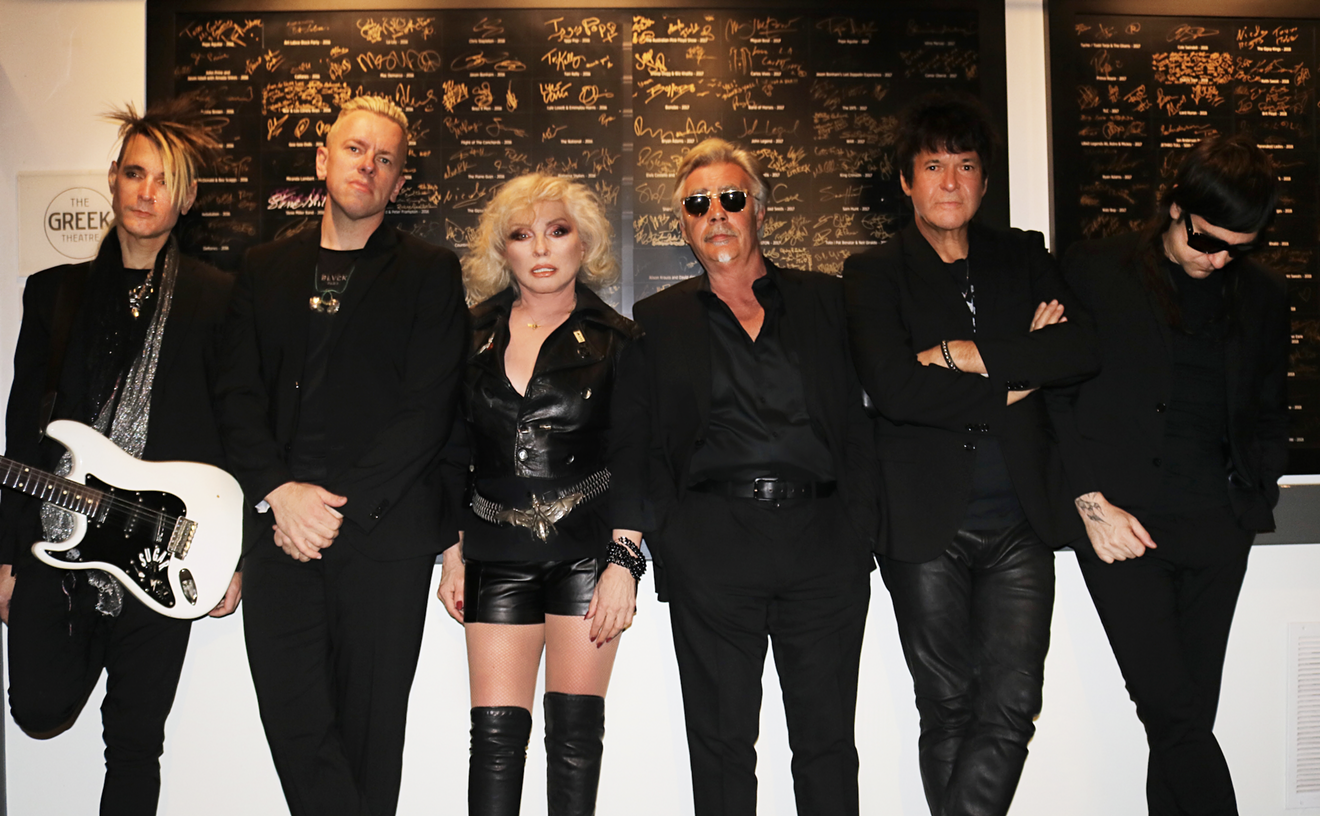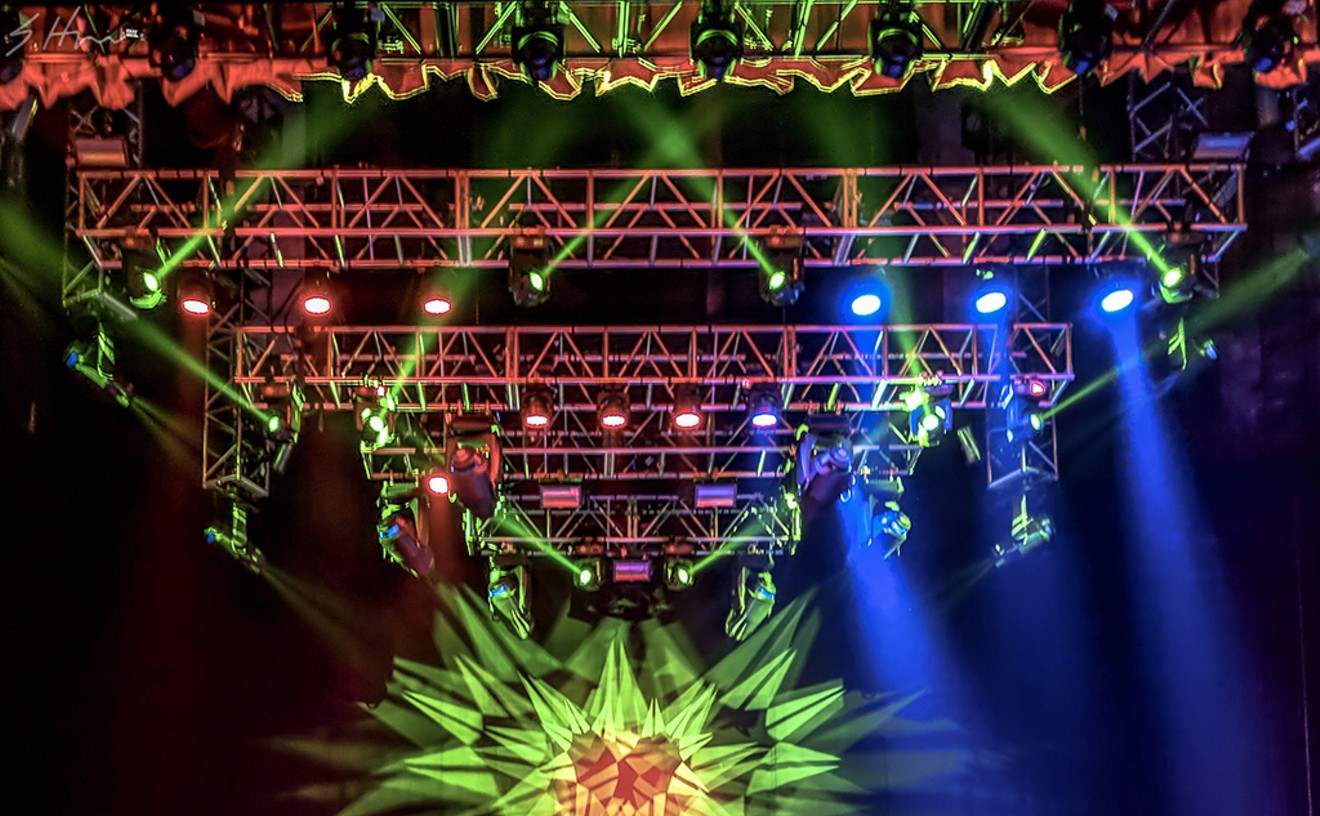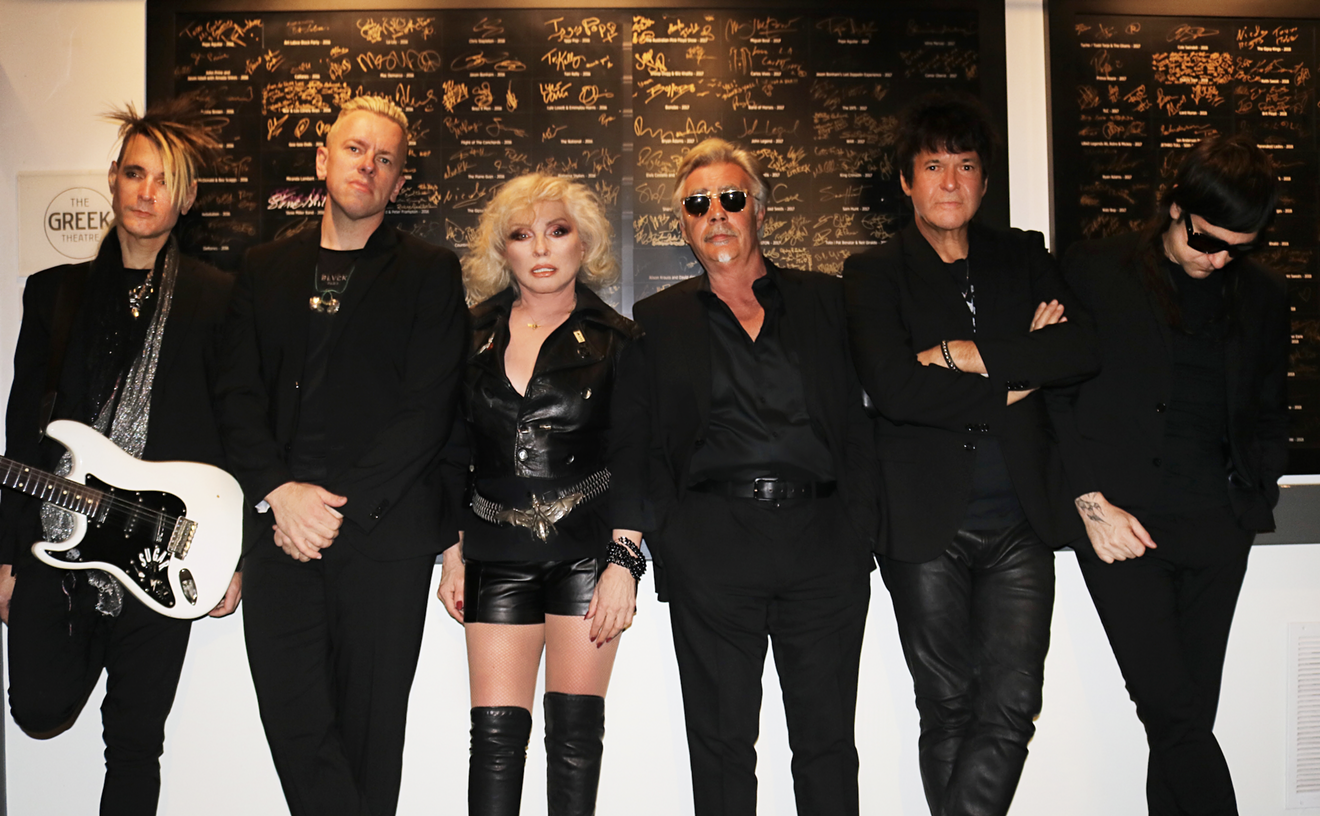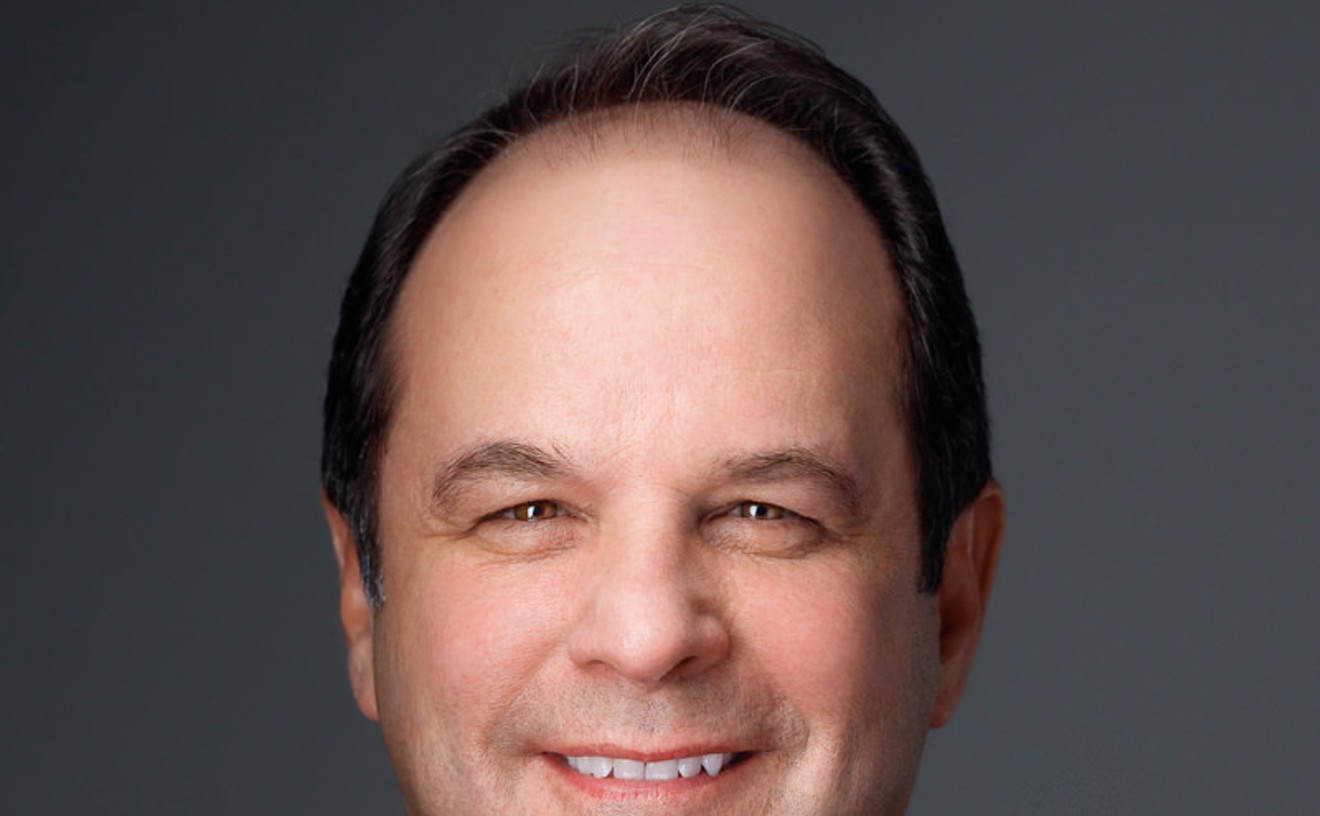Metric’s Emily Haines walked the streets of San Francisco’s Tenderloin District on a Friday afternoon in early October, taking in the sights before the show. Walking around cities and towns is something she enjoys doing on tour, but the scene unfolding before her was absolutely heartbreaking.
“The homelessness and drug crisis reality is vivid,” Haines says. “I always feel like it’s amplified when we come and we play the Fillmore, because it’s such a historic venue.” Metric plays Denver’s Fillmore Auditorium on Saturday, October 15.
Haines adds that as she walks in San Francisco, it’s baffling to think that the area, which has defined much of pop culture for decades and birthed the high technology of Silicon Valley, has left so many "casualties” lying on the sidewalk.
“I always have big historical meditations when I’m in San Francisco,” she says. “I looked at a picture of Jerry Garcia and [thought], ‘Well, I guess that didn’t work out' — you know, the dream.”
She thinks that Metric last played in the city in 2019, and the neighborhood's crime and extreme poverty was jarring then, too. It’s managed to sink even further, however, and she saw similar scenes unfolding across Canada when Metric, which is based in Toronto, embarked on a recent cross-country tour. COVID, coupled with an uptick of drug use, appears to have just eaten out the heart of many small towns. Drugs such as fentanyl have offered people a temporary but deadly respite from the harsh reality of the last few years.
“I don’t envy people whose job it is to figure that shit out,” Haines says. “The fentanyl thing — I didn’t know. I just thought it was something that could kill you, that you would hope wouldn’t be in cocaine. I didn’t know people actually pursue it. I’ve been getting an education on tour.”
Metric’s eighth full-length album, Formentera, takes its name from a small, paradisiacal island in the Mediterranean — exactly the type of place a person in an unpleasant reality might want to slip away to. Numerous artists have traveled there and found inspiration on its sandy beaches. Haines says the band thinks of the record as a bit of a sonic oasis, and the reaction to it thus far has been pretty intense.
“We’ve always had that thing where people are into Metric because they get that there is a component addressing anxiety and depression...and offering some acknowledgement of that,” she says. “More than ever before, people are really needing it.”
The band holds VIP meet-and-greets ahead of shows, and Haines says she sees similarities between the despair she encounters on the road and the stories fans tell her. People cry. Front-line workers talk about working during a global pandemic. Others have attempted suicide or had mental health crises over the past few years. Fans have gotten tattoos of Metric lyrics that had special meaning for them. A paraplegic man recently said that Haines’s lyrics allowed him to mentally free himself from the confines of his wheelchair.
Haines adds that she’s not sure what a standard VIP ticket meet-and-greet looks like — lots of bands do them — but she imagines most aren’t as personal in nature as a Metric event. She gets the sense that not everyone cares as much about people as she and her bandmates try to. It can be heavy, but based on how she describes encounters with fans, she seems to feel that the meetings are a worthwhile endeavor.
Although her lyrics may offer some solace to listeners, Haines is quick to admit that she doesn’t have all the answers, and she believes it's important to convey that message to fans. She’s certainly happy to be of service, but at the same time, she’s not a mental health professional; she’s a musician.
“Please don’t rely on me for any answers in a serious way,” she says. “I don’t really feel qualified for the job, but it’s pretty amazing to see — and at the concerts, it’s just been really expressive. I don’t know. It’s cool. It feels like we're helping people out, because they need it.”
And the tour isn't all just somber moments with fans, nor is it the bleak street scenes Haines is encountering. The band played a sold-out Los Angeles show the night before her walk in the Tenderloin, and the audience was engaged and enthused. That is special, particularly in L.A., where audiences can be “detached,” she says. Metric has been playing for nearly 25 years and has remained independent, sometimes working with substandard gear and nearly empty clubs. That stubborn way of doing business, Haines believes, imparts more value to the music and how people discover it. Playing a cross-section of songs from various eras in its long career to a packed venue is validating, in a way.
“Over the years, we’ve been trying to understand ourselves and what it is we're trying to do,” she says. “[The L.A. show] was really cool. It felt like we understood and they understood, and we were all collectively going, ‘Oh, I get it.’ It’s this kind of free, euphoric kind of cerebral connection.”
The band, which includes James Shaw, Joshua Winstea and Joules Scott-Key is now well into its third decade of existence, but Haines is happy with the music that Metric is currently making. In particular, the nearly eleven-minute-long song “Doomscroller,” which opens Formentera, is a track she calls “the best thing we’ve ever done.” She refuses to accept the maxim that once you get older, everything gets worse. If you think that way, then what’s the point of continuing? she muses. “If people don’t get [the song], it means we made cool art,” she adds. “If people do get it, it’s going to be the most important thing we’ve ever done.”
"Doomscrolling" is the act of spending an inordinate amount of time looking at your phone screen, so just by virtue of its title, the song feels relevant to the current zeitgeist. It opens with a salvo of dissonant synthesizer rhythm that evokes “Dark and Long (Dark Train),” the Underworld track that scores Mark Renton’s descent into opiate withdrawal in the film Trainspotting. The emotion of the music, even if it is a “four on the floor” dance beat, is not lost on Haines.
“That’s what is so cool about electronic music,” she says. “It can be the most douchey thing, or it can be like Jon Hopkins — sort of transporting, ambient, cerebral and really evocative and emotional.”
The song sees Metric working in multiple genres and styles. It’s a spiritual descendant of songs like the Doors' “The End,” in that it feels similar to a journey without being indulgent. Every second feels necessary.
“You end up somewhere else by the end,” Haines agrees. “It’s not tidy. If there’s a bow, it’s down the street and around the corner.”
On "Doomscroller," Haines’s lyrics evoke a struggle between the underclass and the ruling class. Name-checking the idiotic QAnon conspiracy theory imparts a current vibe, but the song doesn’t seem stuck in any particular moment in time. She says the song, both lyrically and musically, tackles the concept of addressing pain — not by ignoring it, but by magnifying it. It establishes the overall point of the record, as well as what Metric has always tried to do with its music. It took a great deal of self-confidence to keep going, even as the members began to worry that the song was too long.
“I’m glad we didn’t lose confidence,” Haines concludes. “That’s always been the hardest. Confidence is a bitch. It’s hard to get it, hard to keep it. At least in this case, we did.”
Metric, 7 p.m. Saturday, October 15, Fillmore Auditorium, 1510 Clarkson Street. Tickets are $37.
[
{
"name": "Air - MediumRectangle - Inline Content - Mobile Display Size",
"component": "12017618",
"insertPoint": "2",
"requiredCountToDisplay": "2"
},{
"name": "Editor Picks",
"component": "17242653",
"insertPoint": "4",
"requiredCountToDisplay": "1"
},{
"name": "Inline Links",
"component": "18838239",
"insertPoint": "8th",
"startingPoint": 8,
"requiredCountToDisplay": "7",
"maxInsertions": 25
},{
"name": "Air - MediumRectangle - Combo - Inline Content",
"component": "17261320",
"insertPoint": "8th",
"startingPoint": 8,
"requiredCountToDisplay": "7",
"maxInsertions": 25
},{
"name": "Inline Links",
"component": "18838239",
"insertPoint": "8th",
"startingPoint": 12,
"requiredCountToDisplay": "11",
"maxInsertions": 25
},{
"name": "Air - Leaderboard Tower - Combo - Inline Content",
"component": "17261321",
"insertPoint": "8th",
"startingPoint": 12,
"requiredCountToDisplay": "11",
"maxInsertions": 25
}
]











